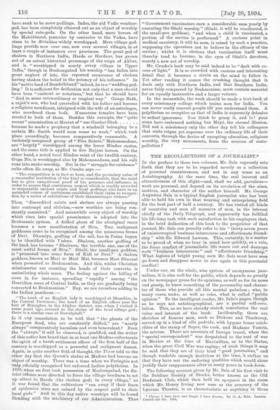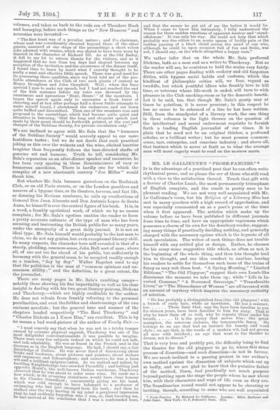THE RECOLLECTIONS OF A JOURNALIST.* IN the preface to these
two volumes, Mr. Sala expressly sets forth that they are to be regarded merely as a collection of personal reminiscences, and not in any sense as an Autobiography. At the same time, the real interest and attractiveness of this slight—and, shall we add, garrulous— work are personal, and depend on its revelation of the aims, motives, and character of the author himself. Mr. George Augustus Sala is a typical English journalist who has been able to hold his own in that wearing and enterprising field for the best part of half a century. He has visited all kinds of countries and seen all manners of men, in the interest chiefly of the Daily Telegraph, and apparently has fulfilled his life-long task with such satisfaction to his employers that, in the brief dedication of this book to the proprietor of that journal, Mr. Sala can proudly refer to his "thirty-seven years of uninterrupted business intercourse and affectionate friend- ship " with Sir Edward Lawson. This, certainly, is a matter to be proud of, when we bear in mind how quickly, as a rule, the fierce conflict of journalistic life wears out and destroys such "business intercourse" and "affectionate friendship." What legions of bright young men Mr. Sala must have seen go down and disappear never to rise again in this perennial conflict !
Under our, on the whole, wise system of anonymous jour- nalism, it is also well for the public, which depends so greatly on the newspaper press for its opinions, as well as for its news and gossip, to know something of the personality and charac- ter of those who provide all this mental pabulum ; who, in many cases, make, as well as echo, what is called "public opinion." To the intelligent reader, Mr. Sala's pages, though as he says not autobiographical, are a partial self-reve- lation. This, as we have already stated, constitutes the real value and interest of the book. Incidentally, there are sketches of famous men, such as Dickens and Thackeray, served up in a kind of olla podrida, with bygone lesser celeb- rities of the stamp of Soyer, the cook, and Madame Vestris, the actress. There are accounts of foreign travel, when the " special correspondent" was despatched to the seat of war in Mexico at the time of Maximilian, or to the States, when the great Civil War was raging ; of such things it may be said that they are of their kind " good journalese," and though readable enough doubtless at the time, it strikes us that they have not the enduring qualities which would alone justify their reappearance after so many years in book-form.
The following account given by Mr. Sala of his first visit to the Sublime Society of Steaks, better known as the Old Beefsteak Club, which then held its symposia in the room which Mr. Henry Irving now uses as the armoury of the Lyceum Theatre, is as characteristic as anything in these 2'hinge I hays Soon and People I have Known. By G. A. Sala. London Cassell and W. 1894, volumes, and takes us back to the rude era of Theodore Hook and horseplay, before such things as the " New Humour " and neurotics were invented " The first toast was of a peculiar nature ; and the chairman, whose seat was considerably elevated beyond those of the other guests, assumed at one stage of the proceedings a short velvet robe adorned with ermine, which was stated to have been worn by Garrick in the character of Richard III. As at the Old Bailey, it fell to my lot to return thanks for the visitors, and as it happened that no less than ten days had elapsed between my reception of the invitation and the occurrence of the dinner itself, I found time to learn by heart what I secretly thought to be really a neat and effective little speech. There was good need for its possessing these qualities, since my host told me of the pro- bable attendance at the Club of two such giants of oratory as Henry Brougham and John Campbell. Well ; when the time arrived I rpse to make my speech, but I had not reached the end of the first sentence before my voice was drowned by the unanimous and uproarious ' Hear, Hears 1 ' of the members. I began the speech again only to encounter a fresh burst of cheering, and at last after perhaps half a dozen futile attempts to make myself heard, I abandoned the endeavour, and sat down quite baffled and discomfited. Then one of the members rose and proposed to the assemblage, which had become quite quiet and attentive in listening, that the long and eloquent speech just made by their guest should be forthwith printed, at the cost and Charges of the Sublime Society, for private circulation only.' " We are inclined to agree with Mr. Sala that the " humours of the Sublime Society" would scarcely appeal to our more fastidious tastes ; but we do not doubt that such practical joking as this over the walnuts and the wine, elicited heartier laughter than frequently follows the best-directed shafts of genuine wit and humour. Truth to tell, considering Mr. Sala's reputation as an after-dinner speaker and raconteur, he has been very sparing in these Reminiscences of racy or humorous anecdotes. There is hardly one for which the compiler of a new nineteenth century " Joe Miller " would thank him.
But whether Mr. Sala becomes garrulous on the Beefsteak Club, or on old Paris streets, or on the London gamblers and usurers of a bygone time, or its theatres, taverns, and fast life, or donning his Mexican sombrero, he calls up recollections of General Don Juan Almonte and Don Antonio Lopes de Santa Anna, he himself is ever the central figure of his book. It is, in a word, a frankly egotistical work, of which we by no means complain ; for Mr. Sala's egotism enables the reader to form a pretty accurate estimate of the type of man who has been amusing and instructing the British public for so many years, nnder the anonymity of a great daily journal. It is not an ideal type; Mr. Sala himself would probably be the last man to claim, we do not say genius, but even exceptional literary skill. In many respects, the character here self-revealed is that of a sturdy, plodding, common-sense, John Bull sort of man; above all, of one not too far ahead of his public, but sufficiently in harmony with the general mass, to be accepted readily enough as a teacher, "day by day." Walter Bagehot used to say that the politician is the man of "common opinions and un- common ability ; " and the definition, to a great extent, fits the journalist.
There are many pages in Mr. Sala's rambling essays— notably those showing his fine impartiality as well as his clear insight in dealing with his two great literary patrons, Dickens and Thackeray,—which are highly creditable to the author.
He does not refrain from frankly referring to the personal peculiarities, and even the foibles and shortcomings of the two eminent novelists ; but the general tone and manner of the chapters headed respectively "The Real Thackeray" and "Charles Dickets as I Knew Him," are excellent. This is by no means a bad word-picture of the author of Vanity Fair :— " I need scarcely say that when he was not in a tetchy temper caused by extreme physical anguish, Thackeray was one of the most delightful conversationalists it was possible to imagine. There were very few subjects indeed on which he could not talk, and talk admirably. 'He was as fluent in the French and in the German as in the English language. He had, I should say, a, fair knowledge of Italian. He was never tired of discoursing about books and bookreen, about pictures and painters, about etchers and engravers and lithographers ; and moreover, he was a born wit and a brilliant epigrammatist. So we walked and talked, by bustling Knightsbridge into crowded Piccadilly ; and halting just .opposite Morel's, the well-known Italian warehouse, Thackeray observed that he was about to order some wine. He made me a bow which, in its weeping stateliness, would have done honour to Sir Charles G-randison ; concurrently giving mo his hand, which was cold enough to have belonged to a professor of swimming who had just emerged from his tank ; and then he stalked over the way, leaving in my mind a perplexed inpression that he had suddenly forgotten who I was, or, that knowing me, he had arrived at the conclusion that I was a confounded bore, and that the sooner he got rid of me the better it would be. When I came to know him intimately, I fully understood the reason for these sudden reactions of apparent hauteur and stand- offishness,' It was only his way. He could not help that which probably was due either to an acute spasm of bodily pain or the sudden passing of a black cloud across the mind of one who, although be could be upon occasion full of fun and frolic, was not, I should say, on the whsle altogether a happy man."
We rather infer that on the whole Mr. Sala preferred Dickens, both as a man and as a writer to Thackeray. But as the reader will see, he contrives to hold the scales very fairly. There are other pages dealing with cookery and old forgotten ditties, with bygone social habits and customs, which the kindliest of philosophic critics will, we fear, regard as twaddle, but which youthful idlers who frankly love to kill time, or veterans whose life-work is ended, will turn to with pleasure in the Club smoking-room or by the domestic hearth. Let it be said, too, that though Mr. Sala's gossip may at times be pointless, it is never prurient ; in this respect he has no cause to be ashamed of a line be has here written. Still, from the standpoint of a literary work, the one thing in these volumes is the light thrown on the question of the intellectual and moral endowment requisite to furnish forth a leading English journalist of our times. It is plain that he need not be an original thinker, a profound scholar, or a brilliant writer; but he must possess common- sense, tact, enterprise, and ceaseless industry ; and above all, that instinct which is never at fault as to what the average man will most eagerly want to read on the morrow morn.



































 Previous page
Previous page